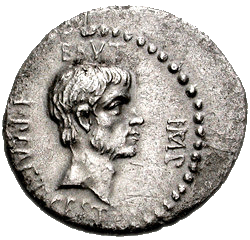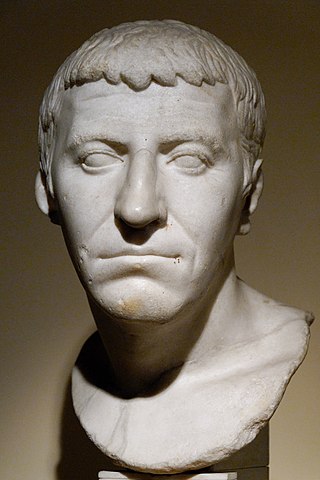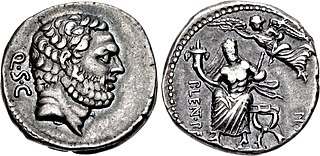Related Research Articles
Year 43 BC was either a common year starting on Sunday, Monday or Tuesday or a leap year starting on Sunday or Monday of the Julian calendar and a common year starting on Monday of the Proleptic Julian calendar. At the time, it was known as the Year of the Consulship of Pansa and Hirtius. The denomination 43 BC for this year has been used since the early medieval period, when the Anno Domini calendar era became the prevalent method in Europe for naming years.

This article concerns the period 49 BC – 40 BC.

Marcus Junius Brutus was a Roman politician, orator, and the most famous of the assassins of Julius Caesar. After being adopted by a relative, he used the name Quintus Servilius Caepio Brutus, which was retained as his legal name. He is often referred to simply as Brutus.

Year 42 BC was either a common year starting on Monday, Tuesday or Wednesday or a leap year starting on Tuesday of the Julian calendar and a common year starting on Tuesday of the Proleptic Julian calendar. At the time, it was known as the Year of the Consulship of Lepidus and Plancus. The denomination 42 BC for this year has been used since the early medieval period, when the Anno Domini calendar era became the prevalent method in Europe for naming years.

Gaius Cassius Longinus was a Roman senator and general best known as a leading instigator of the plot to assassinate Julius Caesar on 15 March 44 BC. He was the brother-in-law of Brutus, another leader of the conspiracy. He commanded troops with Brutus during the Battle of Philippi against the combined forces of Mark Antony and Octavian, Caesar's former supporters, and committed suicide after being defeated by Mark Antony.
The gens Tullia was a family at ancient Rome, with both patrician and plebeian branches. The first of this gens to obtain the consulship was Manius Tullius Longus in 500 BC, but the most illustrious of the family was Marcus Tullius Cicero, the statesman, orator, and scholar of the first century BC. The earliest of the Tullii who appear in history were patrician, but all of the Tullii mentioned in later times were plebeian, and some of them were descended from freedmen. The English form Tully, often found in older works, especially in reference to Cicero, is now considered antiquated.
Decimus Junius Brutus Albinus was a Roman general and politician of the late republican period and one of the leading instigators of Julius Caesar's assassination. He had previously been an important supporter of Caesar in the Gallic Wars and in the civil war against Pompey. Decimus Brutus is often confused with his distant cousin and fellow conspirator, Marcus Junius Brutus.

Porcia, occasionally spelled Portia, especially in 18th-century English literature, was a Roman woman who lived in the 1st century BC. She was the daughter of Marcus Porcius Cato Uticensis and his first wife Atilia. She is best known for being the second wife of Marcus Junius Brutus, the most famous of Julius Caesar's assassins, and appears primarily in the letters of Cicero.

Publius Cornelius Lentulus Spinther was a Roman politician and general. Hailing from the patrician family of the Cornelii, he helped suppress the Catilinarian conspiracy during his term as curule aedile in 63 BC and later served as consul in 57 BC. Denied the opportunity to invade Egypt the following year, he nevertheless won some victories in his province of Cilicia and celebrated a triumph over it in 51 BC.

Publius Servilius Casca Longus was one of the assassins of Julius Caesar and plebeian tribune in 43 BC. He and several other senators conspired to kill him, a plan which they carried out on 15 March 44 BC. Afterward, Casca fought with the liberators during the Liberators' civil war. He is believed to have died at the Battle of Phillipi either by suicide or at the hands of Octavian's forces.

The gens Pompeia was a plebeian family at ancient Rome, first appearing in history during the second century BC, and frequently occupying the highest offices of the Roman state from then until imperial times. The first of the Pompeii to obtain the consulship was Quintus Pompeius in 141 BC, but by far the most illustrious of the gens was Gnaeus Pompeius, surnamed Magnus, a distinguished general under the dictator Sulla, who became a member of the First Triumvirate, together with Caesar and Crassus. After the death of Crassus, the rivalry between Caesar and Pompeius led to the Civil War, one of the defining events of the final years of the Roman Republic.
Gaius Vibius Pansa Caetronianus was consul of the Roman Republic in 43 BC. Although supporting Gaius Julius Caesar during the Civil War, he pushed for the restoration of the Republic upon Caesar’s death. He died of injuries sustained at the Battle of Forum Gallorum.

Julia was the daughter of Julius Caesar and his first or second wife Cornelia, and his only child from his marriages. Julia became the fourth wife of Pompey the Great and was renowned for her beauty and virtue.

Marcus Tullius Cicero minor, or Cicero the Younger, was born in 65 BC. He was the son of the distinguished orator and statesman Marcus Tullius Cicero and his first wife, Terentia. Cicero minor had an elder sister, Tullia, who was born in 79 and died in 45 BC.

Julius Caesar was assassinated by a group of senators on the Ides of March of 44 BC during a meeting of the Senate at the Curia of Pompey of the Theatre of Pompey in Rome where the senators stabbed Caesar 23 times. They claimed to be acting over fears that Caesar's unprecedented concentration of power during his dictatorship was undermining the Roman Republic. At least 60 to 70 senators were party to the conspiracy, led by Marcus Junius Brutus, Gaius Cassius Longinus, and Decimus Junius Brutus Albinus. Despite the death of Caesar, the conspirators were unable to restore the institutions of the Republic. The ramifications of the assassination led to his martyrdom, the Liberators' civil war and ultimately to the Principate period of the Roman Empire.
The gens Helvia was a plebeian family at ancient Rome. This gens is first mentioned at the time of the Second Punic War, but the only member of the family to hold any curule magistracy under the Republic was Gaius Helvius, praetor in BC 198. Soon afterward, the family slipped into obscurity, from which it was redeemed by the emperor Pertinax, nearly four centuries later.
The gens Laelia was a plebeian family at Rome. The first of the gens to obtain the consulship was Gaius Laelius in 190 BC.

The gens Pupia was a plebeian family at ancient Rome. Members of this gens are mentioned as early as 409 BC, when Publius Pupius was one of the first plebeian quaestors, but over the course of centuries they achieved little of significance, and rarely held any of the higher offices of the Roman state.
The gens Satria was a minor plebeian family at ancient Rome. Members of this gens are mentioned in the first century BC, and under the early Empire, but none of them rose higher than the rank of praetor. Otherwise the Satrii are known largely from inscriptions.
The Siege of Apamea was an abortive siege of Apamea in Syria. Lucius Statius Murcus and Quintus Marcius Crispus led the attempt to capture the city, the equestrian Quintus Caecilius Bassus led its defence.
References
- ↑ Broughton 1952, pp. 307, 330.
- ↑ Cic. Phil., 2.11; Cic. Fam., 6.12.
- ↑ Toher 2005, p. 183. The identity of the brother is not known; it may have been the Quintus Tillius mentioned at Caes. BCiv., 3.42.3, but there is no confirmation thereof.
- ↑ Suet. Iul., 82.1.
- ↑ Toher 2005; Sen. Ep., 83.11.
- ↑ Toher 2005, p. 183.